La Chienne Blu-ray Movie
HomeLa Chienne Blu-ray Movie 
The BitchCriterion | 1931 | 96 min | Not rated | Jun 14, 2016
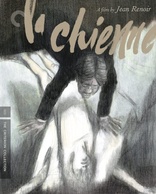
Movie rating
7.2 | / 10 |
Blu-ray rating
| Users | 0.0 | |
| Reviewer | 4.5 | |
| Overall | 4.5 |
Overview
La Chienne (1931)
An unhappily married cashier and amateur painter becomes so smitten with a prostitute that he refuses to see the obvious: that she and her pimp boyfriend are taking advantage of him.
| Foreign | 100% |
| Drama | 92% |
Specifications
Video
Video codec: MPEG-4 AVC
Video resolution: 1080p
Aspect ratio: 1.2:1
Original aspect ratio: 1.2:1
Audio
French: LPCM Mono (48kHz, 24-bit)
Subtitles
English
Discs
50GB Blu-ray Disc
Single disc (1 BD)
Playback
Region A (locked)
Review
Rating summary
| Movie | 4.0 | |
| Video | 5.0 | |
| Audio | 5.0 | |
| Extras | 4.5 | |
| Overall | 4.5 |
La Chienne Blu-ray Movie Review
Reviewed by Dr. Svet Atanasov July 24, 2016Jean Renoir's "La Chienne" (1931) arrives on Blu-ray courtesy of Criterion. The supplemental features on the disc include filmed archival by Jean Renoir; the director's first sound film "On Purge Bebe"; new video interview with film scholar Christopher Faulkner; and Jacques Rivette's documentary feature "Jean Renoir Le Patron: Michel Simon". The release also arrives with an illustrated leaflet featuring Ginette Vincendeau's essay "He, She, and The Other Guy". In French, with optional English subtitles for the main feature. Region-A "locked".
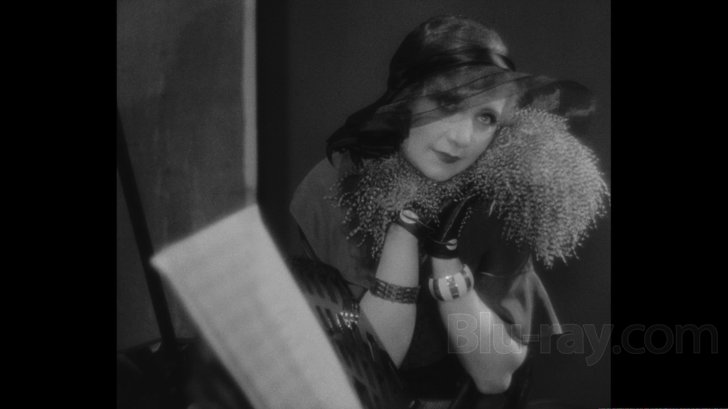
Lulu
Jean Renoir’s second sound film, La Chienne (The Bitch), follows a group of characters leading double lives in the City of Lights. The first is Lulu (Janie Marèse). She is a young and beautiful prostitute who spends most of her time in an area of Montmartre where gentlemen with deep pockets, artists and intellectuals gather to have a good time. At night, Lulu visits the busy cafes and bistros and does her best to impress. She shares her earnings with Dede (Georges Flamant), a suave pimp who has made her believe that they were meant to be together. Dede occasionally makes love to Lulu, but all he really cares for is that Lulu keeps making money for him. The third character is Maurice (Michel Simon). He is a quiet middle-aged cashier for a local company who likes to paint in his free time. He is talented, but his wife, Adele (Magdeleine Bérubet), is convinced that he isn’t a true artist because he isn’t making enough from his paintings to quit his regular job.
When Maurice meets Lulu in Montmartre, he suddenly rediscovers his passion for life. The two begin seeing each other and soon after Maurice falls madly in love with Lulu. He secretly buys her gifts and gives her money, which she promptly redirects to Dede. Maurice even gives her some of his portraits and Dede sells them to a local art dealer (Lucien Mancini), insisting that he is representing a brilliant but unknown American painter. For a while, everyone is happy -- Maurice gets Lulu’s ‘love and affection’ and feels alive again; Lulu has more time for her real lover and no longer visits the cafes and bistros; and Dede has plenty of money to spend with his friends.
The happy times abruptly come to an end when Maurice is confronted by a man claiming that he is Alexis Godard (Marcel Courmes), Adele’s first husband whom everyone believes died on the front years ago, and demands a large sum of money from him so that he quietly disappears again. Instead of paying off the man, Maurice decides to reunite him with Adele and start a new life with Lulu, but when he initiates his scheme, all hell breaks loose.
Renoir’s film is based on a novel by Georges de La Fouchardière that essentially dispels a series of myths. One such myth that is targeted in the film is that in the art world, true works of art always find a way to shine. (There is an excellent sequence in which the dealer that buys Maurice’s paintings tells Dede that masterpieces and reputations are actually created by critics). Another myth is that the upper class and the working class are profoundly different. (The two key character transformations in the film prove precisely the opposite. The only profound difference between them is that one has the financial means to define and exploit the other). There is also the myth that true love brings out the best in people. (The film plants the seeds of doubt as it shows that it also forces people to commit dangerous acts that can destroy their lives).
The film is quite cynical, but in a way also uplifting. It makes a good case that even though people do a great deal of harm to each other, the majority of them would strive to be good as well. They just need to be given a chance to succeed and encouraged to open their hearts.
The framing, lighting choices, and especially the use of sound are very interesting. Some of the nighttime footage, for instance, easily could have been used in a stylish film noir. However, elsewhere, a lot of the visuals have a raw documentary appearance. Also, Renoir shot the film with 'direct sound on-location' and as a result some of the dialog absorbs various organic sounds and noises.
In 1945, Fritz Lang directed the excellent film noir Scarlet Street with Edward G. Robinson, Joan Bennett and Dan Duryea, which is based on the same novel by Georges de La Fouchardière.
La Chienne Blu-ray Movie, Video Quality 
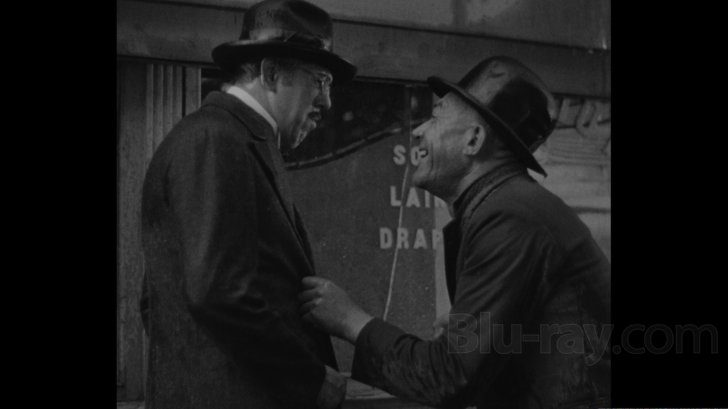
Presented in an aspect ratio of 1.2:1, encoded with MPEG-4 AVC and granted a 1080p transfer, Jean Renoir's La Chienne arrives on Blu-ray courtesy of Criterion.
Please note that the screencaptures included with our review appear in the following order:
1. Screencaptures #1-20: La Chienne.
2. Screencaptures # 22-28: On Purge Bebe.
The following text appears inside the leaflet provided with this Blu-ray release:
"This new digital transfer was created in 4K resolution from a 35mm safety fine-grain made from the original 35mm nitrate negative. The film was restored in 2K resolution at Digimage Classics by Les Films du Jeudi and the Cinematheque francaise, with the support of the CNC and the participation of the Franco-American Cultural Fund DGA -- MPA -- SACEM -- WGAW. The original monaural soundtrack was remastered from the 35mm optical soundtrack negative and restored by L.E. Diapason."
Early reports from Cannes Classics, where the new restoration was screened, were very positive, and I am happy to confirm that the film does indeed look magnificent now. Depth and detail are enormously impressive and the entire film looks very healthy. (There are only a couple of shaky reel transitions, but it is easy to tell that they are in fact inherited). Density is also very good and as a result there are no fluidity-related issues. Additionally, there are no traces of problematic degraining or sharpening adjustments. What this means is that even when projected on a very large screen the film boasts a solid, enormously pleasing organic appearance. (Note: This is a Region-A "locked" Blu-ray release. Therefore, you must have a native Region-A or Region-Free player in order to access its content).
La Chienne Blu-ray Movie, Audio Quality 
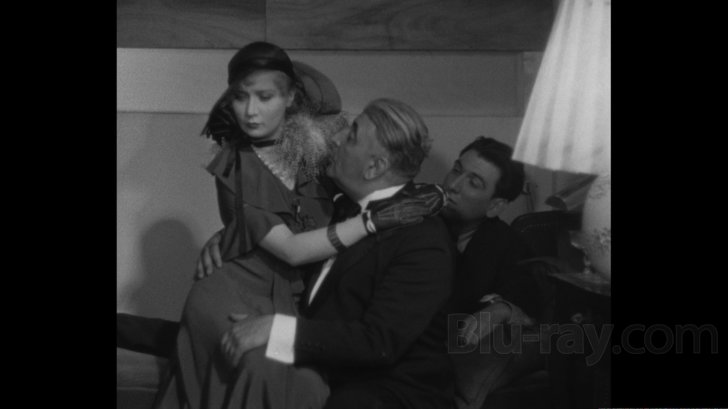
There is only one standard audio track on this Blu-ray release: French LPCM 1.0. Optional English subtitles are provided for the main feature.
I've seen a number of releases of recent restorations of French films where the folks at L.E. Diapason were involved with the audio restoration and the end result has always been very impressive. This release of La Chienne continues the trend. Indeed, it immediately becomes obvious that careful work was done to rebalance, stabilize, and clean up the audio as best as possible. Depth and clarity are very good. There are a couple of short segments where some extremely light 'thinning' is noticeable in the mid-register, but the fluidity is never compromised. (The film was shot with 'direct sound on-location' and because the recording equipment at the time was fairly basic there are some minor inconsistencies, such as the 'thinning' mentioned above. Some of the dialog also absorbs various organic sounds and noises, which is why at times it can be more concentrated and difficult to follow).
La Chienne Blu-ray Movie, Special Features and Extras 
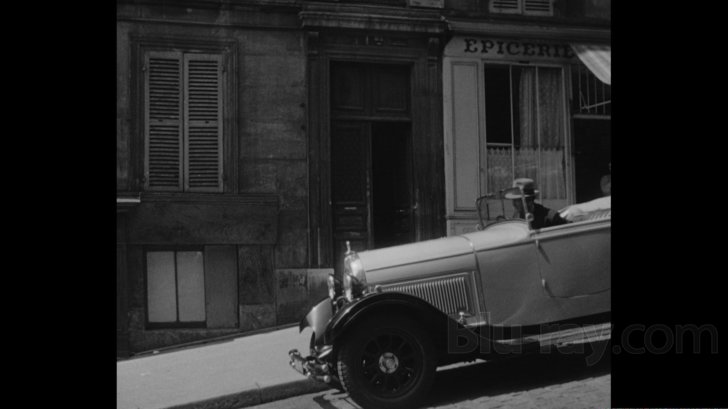
- Jean Renoir Introduction - presented here is an archival filmed introduction to La Chienne by director Jean Renoir. The introduction originally aired on French television on January 1, 1961. In French, with optional English subtitles. (3 min, 1080i).
- On Purge Bebe (1931) - On Purge Bebe was Jean Renoir's first sound film. It was a big hit with French audiences and the people that financed it. Its success reassured French producers that Jean Renoir's sound films would be as well received and financially affordable as his silent films. On Purge Bebe was released shortly before La Chienne.
On Purge Bebe was restored at Digimage Classics by Les Films du Jeudi, with the support of the CNC and the collaboration of the Museo Nazionale del Cinema di Torino. In French, with optional English subtitles. (52 min, 1080p).
- Christopher Faulkner - in this new video interview, film scholar Christopher Faulkner discusses Jean Renoir's transition from silent films to sound films, the production history of On Purge Bebe, the importance of La Chienne in his body of work, some of the key themes in the film and the contrasts and similarities between the art world and the underworld, the dilemmas Lulu and Maurice Legrand face, Jean Renoir and Michel Simon's professional relationship and some interesting similarities between the two, etc. The interview was conducted exclusively for Criterion in Ottawa in February 2016. In English, not subtitled. (26 min, 1080p).
- Jean Renoir Le Patron: "Michel Simon" - Jean Renoir Le Patron is a three-part documentary series directed by Jacques Rivette that was originally broadcast in 1967. Presented here is the second episode in which Jean Renoir and Michel Simon discuss the rules of etiquette in acting (with various references to La Chienne and Boudu Saved From Drowning), La Chienne and its story, the negative reaction the producers of the film initially had and the editing requests they made, sex and why it was a taboo subject in cinema at the time (as well as Salvador Dali's claim that humans know happiness in just one state: as a fetus), directing methods in France and America, etc. In French, with optional English subtitles. (96 min, 1080i).
- Leaflet - an illustrated leaflet featuring Ginette Vincendeau's essay "He, She, and The Other Guy" and technical credits. (The author is a professor of film studies at King's College London. She has written widely on popular French cinema and is a regular contributor to Sight & Sound. She coedited the Wiley-Blackwell Companion to Jean Renoir).
La Chienne Blu-ray Movie, Overall Score and Recommendation 
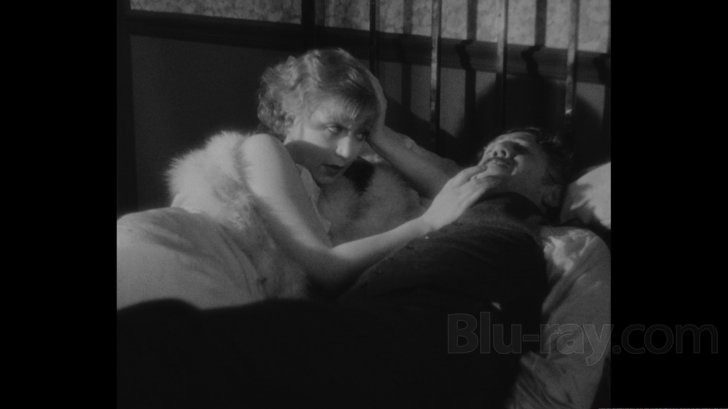
The great French actor Michel Simon is excellent as a disillusioned cashier whose life spins out of control after he falls in love with a beautiful prostitute in this early film from Jean Renoir. The film is quite cynical, but many of its key points are actually impossible to dismiss. La Chienne has been recently restored in France and it looks spectacular on Blu-ray. Criterion have also included Jean Renoir's fist sound film, On Purge Bebe, also recently restored, and a very good archival documentary feature from Jacques Rivette. HIGHLY RECOMMENDED.
Similar titles
Similar titles you might also like

Sansho the Bailiff
山椒大夫 / Sanshô dayû
1954

The Conformist
Il Conformista | 4K Restoration
1970

The Merchant of Four Seasons
Händler der vier Jahreszeiten
1971

The Marriage of Maria Braun
Die Ehe der Maria Braun
1978

Julieta
2016

Phoenix
2014

Sarah's Key
Elle s'appelait Sarah
2010

Pixote
Pixote: A Lei do Mais Fraco
1980

Lilya 4-ever
2002

Les Dames du Bois de Boulogne
1945

Le bonheur
1965

The Painted Bird
Nabarvené ptáce / Slipcover in Original Pressing
2019

Stroszek
1977

Germany Year Zero
Germania anno zero
1948

Death in the Garden
La mort en ce jardin
1956

A Touch of Sin
天注定 / Tian zhu ding
2013

The Salesman
Forushande
2016

Amarcord
1973

All About My Mother
Todo sobre mi madre
1999

Spetters
1980